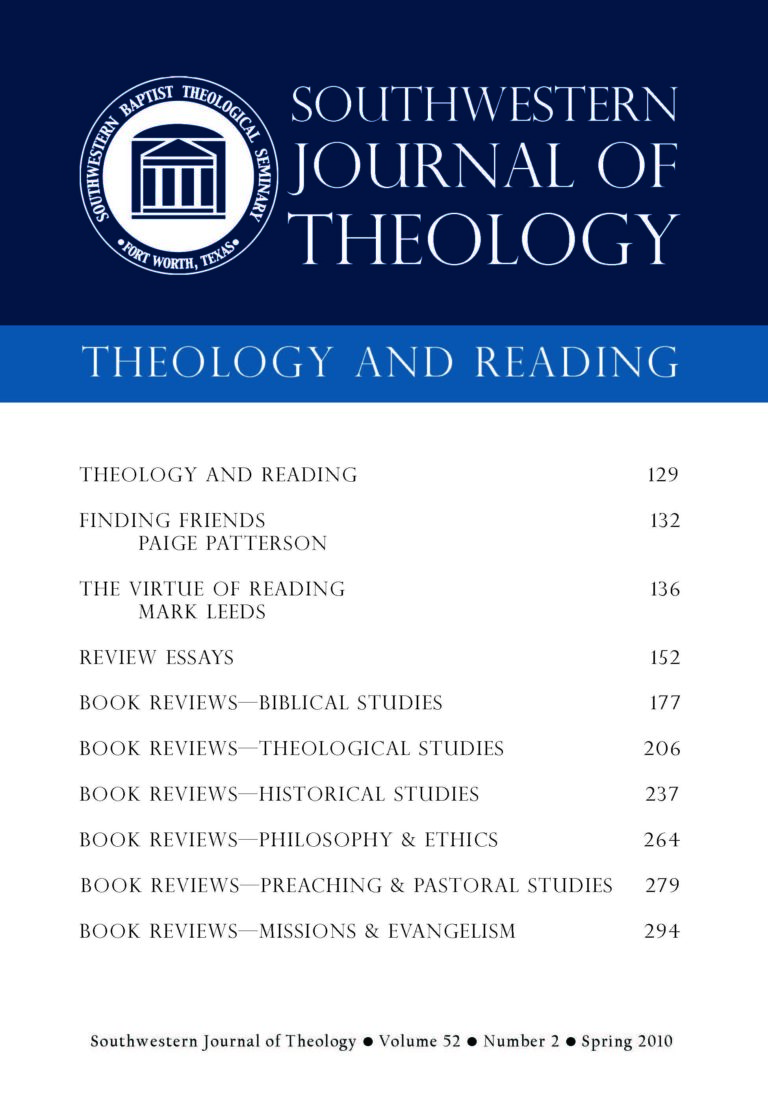
Theology and Reading
Southwestern Journal of Theology
Volume 52, No. 2 – Spring 2010
Managing Editor: Malcolm B. Yarnell III
Edited by John Webster, Kathryn Tanner, and Iain Torrance. Oxford: Oxford University Press, 2007. 708 + xii pages. Hardcover, $155.00.
From one of the world’s preeminent university presses comes a volume that scholars will find indispensible, but one which some casual readers might find largely inaccessible—and this not merely due to its price. The title of this volume, The Oxford Handbook of Systematic Theology, may initially give the impression that this Handbook is intended to be an introductory aid to a neophyte theology student. In reality it is an introduction to the academic discipline of systematic theology, or more accurately, the academic study of systematic theology in a university setting. As the very brief foreword describes the purpose of this volume, it “is intended as an overall account of the field of systematic theology as it is undertaken by contemporary practitioners” (xii). The intended audience is clearly identified as those doing research or teaching in the field of systematic theology. The list of contributors includes some of the most highly regarded scholars in the Englishspeaking world.
Reflecting the stated purpose of this work, each contributor was asked to follow a basic three-fold plan: “(1) to offer an analysis of the state of the question in their assigned topic; (2) to indicate important issues of contention, whether formal or material, and how they are variously resolved; (3) to make judgements [sic] about the ways in which inquiry into a particular topic might more fruitfully be pursued” (xii). Since the contributors generally follow this plan—at least in broad outline—the reader receives a thoughtful analysis of the current state of research in each of the various topics addressed as well as prospects for future research in the area. The rather extensive bibliographies appended to each article provide a good place to begin that research.
The Handbook is divided into four major parts. Following an introductory essay by John Webster, Part I, entitled “Doctrines,” offers seventeen essays on the major theological loci. These are not systematic presentations of the various doctrines but, following the stated purpose of the work, they are discussions of the issues and debates of the past and present along with prospects for what the future may hold in regard to research in the various theological loci. Part II, “Sources,” deals with the expected subjects of revelation, Scripture, and tradition, but it adds discussions on the possibilities of contribution from worship, reason, and experience. Part III, “Conversations,” addresses issues related to the relationship between systematic theology and other disciplines such as biblical studies, ethics, and the natural sciences, to name just a few. A common theme in these articles is the atomization, following the Enlightenment, of theological enquiry into more discreet specializations such as biblical studies or Christian ethics. Previous to the Enlightenment all of these areas would have been proper topics of discussion for the “theologian.” Even though all the articles in this volume are forward looking insofar as each contributor seeks to deal with possible future directions in research in the various topics presented, the fourth and final division, entitled “Prospects,” discusses the future prospects for various approaches to theology, including Postmodern, Liberation, and Feminist theologies.
Although the articles in this volume are directed towards those in the academy, readers are unlikely to meet with the kind of cold skepticism characteristic of Neo-Protestantism, which was common during the first half of the last century. In fact, doctrines such as the Trinity are presented as being central to Christian theology, reflecting the shift in the middle of the last century away from the generic, often Deistic God of Modernism and a return to the distinctively Christian God of Scripture. Indeed, the doctrine of the Trinity appears in several articles as a central conceptual or organizing principle for theology.
While even the non-specialist may find the content of this work helpful, potential purchasers should remember that the intended audience of this Handbook is the scholar doing research and teaching in the field of systematic theology. This is not to say that the content is beyond the grasp of the typical seminary student or the pastor of a local church. Rather, this caveat is offered as a reminder that The Oxford Handbook of Systematic Theology is written primarily for an academic audience. Despite the somewhat limited audience, the breadth of topics covered and the depth of analysis of the issues discussed combine to make this work a significant contribution to the field.





